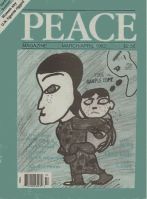
Peace Magazine Mar-Apr 1992, page 14. Some rights reserved.
Search for other articles by Ayad Al-Qazzaz here
In January the United States marked the first anniversary of the Gulf War. President Bush told the American public that the Gulf War had not been against the Iraqi people but against the "little" dictator Saddam Hussein. Yet Hussein is still in power, enjoying all the amenities of modern life. I argue that the real target of the Gulf War was not Hussein but the infrastructure of Iraq, with its capacity to make Iraq a major player in the Gulf region.
U.S. officials discuss publicly some of the reasons why they did not pursue the removal of Saddam from power. They say that getting rid of Saddam would have prolonged the war, with negative consequences domestically and internationally. They say it would have meant more American casualties, potential splits in the Coalition forces, and increased anger among the Arab masses. World opinion might have responded negatively to this expansion of the war objectives beyond the U.N. resolution to liberate Kuwait. And replacing Saddam with a new government would have meant lengthening the stay of the U.S. forces to prop it up. Such a move would have been fraught with dangers, including resentment against the U.S. both in Iraq and the region, and an escalation of costs.
There are other reasons which U.S. officials do not discuss publicly but that were, in my opinion, instrumental in discouraging the U.S. from removing Saddam from power.
There is no viable alternative to Saddam in the aftermath of the Gulf War. There are over twenty opposition groups, whose ideologies range from extreme left to extreme right, with no outstanding charismatic leader who may command the respect and the backing of the Iraqi people.
Nevertheless, the U.S. preference for Saddam may be waning. Because the Democrats are beginning to use Saddam's comfortable survival in power as a political issue in this election year, Bush is going to have to do something about the matter, whether he likes it or not, Saddam is becoming a liability.
Ayad al-Qazzaz is a sociology professor at California State University in Sacramento.

Peace Magazine Mar-Apr 1992, page 14. Some rights reserved.
Search for other articles by Ayad Al-Qazzaz here